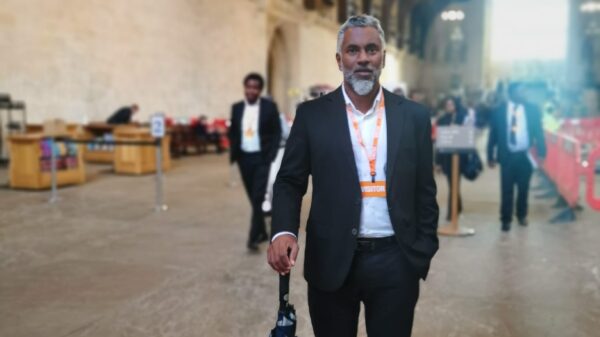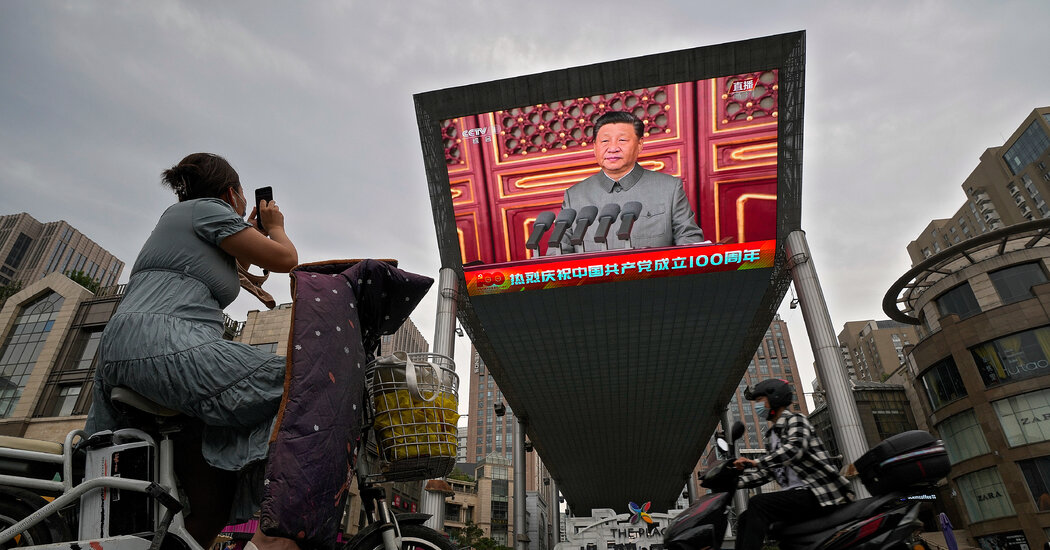Five articles from around The Times, narrated just for you.
This weekend, listen to a collection of narrated articles from around The New York Times, read aloud by the reporters who wrote them.
How China Under Xi Jinping Is Turning Away From the World
The miracle of modern China was built on global connections, a belief that sending young people, companies and future leaders to soak up the outside world was the route from impoverishment to power. Now, emboldened by its transformation, the country is shunning the influences and ideas that nourished its rise.
The country’s most dominant leader in decades, Xi Jinping, seems intent on redefining China’s relationship with the world, recasting the meeting of minds and cultures as a zero-sum clash.
Education officials are imposing restrictions on English education and requiring that scholars ask permission to attend even virtual international conferences. Regulators have punished Chinese companies for raising money overseas. Mr. Xi has exhorted artists to embrace “cultural confidence” by promoting traditional Chinese literature and art, and has warned against imitating Hollywood.
◆ ◆ ◆
Putin Seems to Sideline Advisers on Ukraine, Taking a Political Risk
Written and narrated by Amanda Taub
Putin Seems to Sideline Advisers on Ukraine, Taking a Political Risk
Does President Vladimir V. Putin of Russia have the support he needs at home to wage a costly war in Ukraine?
That may seem to be an odd question. After all, Mr. Putin has already invaded Ukraine, suggesting he feels confident in his resources. And his public image is that of a strongman, with the power to direct the Russian state as he pleases.
But no leader can govern alone. And a series of events this week, including Russia’s decision to throttle access to Facebook and censor news about the war in Ukraine, raise questions about just how much political support Mr. Putin will be able to draw on during the conflict.
◆ ◆ ◆
In Mideast, After Decades of War, the Mass Flight From Ukraine Resonates
Written and narrated by Mona El-Naggar
In Mideast, After Decades of War, the Mass Flight From Ukraine Resonates
The spectacle of a mass flight out of Ukraine was resonating deeply in the Middle East, with many taking to social media to express their sympathy and to commiserate with the plight of those now forced to flee their homes amid a Russian military invasion.
But in a region that has been plagued by seemingly endless wars, the empathy was tinged with bitterness from some who saw European nations taking a more compassionate stance toward the Ukrainians than they had in recent years toward Arab and Muslim migrants trying desperately to reach the safety of Europe’s shores.
◆ ◆ ◆
How to Talk to Kids About Ukraine
Written and narrated by Melinda Wenner Moyer
How to Talk to Kids About Ukraine
If your kids have heard about the Russian invasion of Ukraine, they may be feeling nervous. Thanks to social media and online outlets, young people have access to more news sources than ever. Many are bound to have questions about the history between the two countries and how the clash may affect the rest of the world.
How should you answer your kids’ questions about what’s going on? If they don’t ask, should you bring up the issue yourself?
Here’s what experts suggest.
◆ ◆ ◆
Soccer, Russia and a Line Drawn Too Late
Written and narrated by Rory Smith
Soccer, Russia and a Line Drawn Too Late
The troops were already over the border, the fighter jets screaming low through the skies, smoke billowing from the airfields when Schalke decided to act. The sound of the air raid sirens wailing, the sight of families huddled in subway stations, the images of thousands desperately fleeing Kyiv, a full-scale invasion: That was where it drew the line.
Everything else, Schalke had been prepared to swallow. It did not bat an eyelid during the brief, brutal war with Georgia in 2008, or at Russia’s annexation of Crimea in 2014, or at the downing of a passenger jet the same year, or at the poisoning of Sergei and Yulia Skripal in 2018, or at Vladimir V. Putin’s longstanding support for and arming of Bashar al-Assad’s murderous regime in Syria.
Until last week, when the club suddenly discovered its moral compass. Gazprom’s logo was being removed from its jerseys, a statement on the club’s website read, because of the euphemistically titled “recent developments” in Ukraine.
Want to hear more narrated articles from publications like The New York Times? Download Audm for iPhone and Android.
The Times’s narrated articles are made by Tally Abecassis, Parin Behrooz, Anna Diamond, Sarah Diamond, Jack D’Isidoro, Aaron Esposito, Dan Farrell, Elena Hecht, Adrienne Hurst, Elisheba Ittoop, Emma Kehlbeck, Marion Lozano, Tanya Pérez, Krish Seenivasan, Margaret H. Willison, Kate Winslett, John Woo and Tiana Young. Special thanks to Sam Dolnick, Ryan Wegner, Julia Simon and Desiree Ibekwe.

























